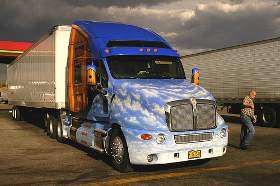Being A Truck Driver With Diabetes.
Topic 16640 | Page 1

I am no expert, but if you enter "diabetes" into the search bar at the top of the page, many people have already gone through this and posted their experiences.
Good luck.
Type I diabetes always uses injections, although sometimes Type II uses them too. If you do have to use injections, there is a Federal Diabetes Exemption you can apply for, but I think one of the requirements is that you have to first demonstrate good control for something like a year on insulin injections, if I remember correctly. You should be able to find more information here: Federal Diabetes Exemption Program
I have the exemption. It is kind of a PITA but at least I can drive. I've posted in more detail about it in other threads. Use the search bar to find some of those. In general, the OTR lifestyle and diabetes do not go very well together, in my opinion. Now that I'm on a dedicated gig and have more flexibility in my schedule it's not so bad, but all the sitting still isn't so great for your blood sugar levels.
I'll try to answer any questions you may have about diabetes or the exemption.
OTR:
Over The Road
OTR driving normally means you'll be hauling freight to various customers throughout your company's hauling region. It often entails being gone from home for two to three weeks at a time.
CSA:
Compliance, Safety, Accountability (CSA)
The CSA is a Federal Motor Carrier Safety Administration (FMCSA) initiative to improve large truck and bus safety and ultimately reduce crashes, injuries, and fatalities that are related to commercial motor vehicle
FMCSA:
Federal Motor Carrier Safety Administration
The FMCSA was established within the Department of Transportation on January 1, 2000. Their primary mission is to prevent commercial motor vehicle-related fatalities and injuries.
What Does The FMCSA Do?
- Commercial Drivers' Licenses
- Data and Analysis
- Regulatory Compliance and Enforcement
- Research and Technology
- Safety Assistance
- Support and Information Sharing
DOT:
Department Of Transportation
A department of the federal executive branch responsible for the national highways and for railroad and airline safety. It also manages Amtrak, the national railroad system, and the Coast Guard.
State and Federal DOT Officers are responsible for commercial vehicle enforcement. "The truck police" you could call them.
Fm:
Dispatcher, Fleet Manager, Driver Manager
The primary person a driver communicates with at his/her company. A dispatcher can play many roles, depending on the company's structure. Dispatchers may assign freight, file requests for home time, relay messages between the driver and management, inform customer service of any delays, change appointment times, and report information to the load planners.HOS:
Hours Of Service
HOS refers to the logbook hours of service regulations.Difference Between Type I & II Diabetes
Type II diabetes typically doesn't require insulin, but it can progress to insulin dependent diabetes.
You DO want to go get this checked out though. Your Doctor will run some blood tests. Most important indicator is the Hemoglobin A1C test - which shows how much glucose is accumulated in your plasma over a 3 month period. Another test they will probably want to run is a Glucose Tolerance Test - which will show how your body deals with sugar.
Being obese (really overweight) can contribute to high blood sugar, and over time can fry your bodies ability to produce insulin.
Having a glucose level of 300 is pretty bad - you want to worry about YOUR HEALTH FIRST - then trucking.
Rick

Thank you, Paul W. and Rick S. for replying. It was a shock to me that they told me I have diabetes. My doctor told me that the symptoms that I show are most likely type 2 of diabetes. My grandfather had type 2 diabetes later on while being a truck driver so it does run in my family. The reason why my glucose level being that high I would think is because I weight 325 pounds only being 26 years old. I don't get that much exercise but I would change that and do anything that I have to so I don't have to be on the insulin injections. At the moment I am not on a diet I just eat fast food most of the time and that is the reason I have diabetes. I would think by walking around for 30m to an hour a day would be the good exercise for my diabetes. Is it hard to eat well on the road?

Hello Jordan.
I have Type II diabetes and flunked the DOT medical too. I had lost my job and insurance and had no meds, so my blood sugar level was way too high. The good news is that Type II can be pretty easy to keep under control.
I started walking 3 miles every day. I talked to my pharmacist and was able to get a price break on my meds. I also rarely eat fast food anymore. Yes, cooking your own meals is a bit of a pain, but you can control what types of food you eat.
My blood sugar level went from being over 500 to under 200 in 3 weeks. My levels are now between 140 and 150.
I'm working on trying to resolve my sleep apnea issues now. If/when I get that done, I will pursue trucking.
Good Luck and Stay Safe Out There, Colin K.
DOT:
Department Of Transportation
A department of the federal executive branch responsible for the national highways and for railroad and airline safety. It also manages Amtrak, the national railroad system, and the Coast Guard.
State and Federal DOT Officers are responsible for commercial vehicle enforcement. "The truck police" you could call them.
Sleep Apnea:
A physical disorder in which you have pauses in your breathing, or take shallow breaths, during sleep. These pauses can last anywhere from a few seconds to a few minutes. Normal breathing will usually resume, sometimes with a loud choking sound or snort.
In obstructive sleep apnea, your airways become blocked or collapse during sleep, causing the pauses and shallow breathing.
It is a chronic condition that will require ongoing management. It affects about 18 million people in the U.S.
New Reply:
New! Check out our help videos for a better understanding of our forum features

















Preview:








 TT On Facebook
TT On Facebook
I had my Dot physical this week everything went ok I pass all the test for the physical but during the drug test they found sugar so they test my blood sugar level to see what my glucose I had. My glucose level was at 300 and because I have a Med hold. I want would to know how is it like being a truck driver while having diabetes? Don't know if my diabetes is type 1 or type 2. From what I was told you can't use the injection insulin only the pills but is it only type 1 diabetes that needs the injections?
DOT:
Department Of Transportation
A department of the federal executive branch responsible for the national highways and for railroad and airline safety. It also manages Amtrak, the national railroad system, and the Coast Guard.
State and Federal DOT Officers are responsible for commercial vehicle enforcement. "The truck police" you could call them.